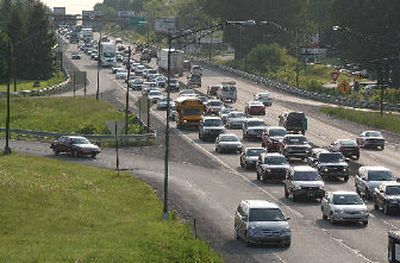Clogged traffic not just a big-city problem

ALLENTOWN, Pa. – By 7 a.m., traffic is backed up through four stoplights along this city’s main drag. Cars are circling for spots in a “park and ride,” where carpoolers meet and buses head for Philadelphia or New York 50 and 100 miles away. The highways are jammed.
“Having grown up in the area, I’m absolutely shocked,” says Nancy Shadlow, who moved back two years ago to the eastern Pennsylvania valley where she was raised. “I’m shocked how much traffic there is, all day long. Not during just rush-hour times.”
Shadlow’s complaint echoes across scores of American cities, home to tens of millions of beleaguered commuters. Every day, they’re dealing with more cars on the road than ever, longer tie-ups and an epidemic of traffic congestion that’s spread far beyond big cities. Clogged roads have become a headache in once-quiet places such as Charleston, S.C.; Colorado Springs, Colo.; and Omaha, Neb.
Disagreement over what to do about the problem – and a lack of money and political will to either dramatically expand roads or radically change the way the nation gets around – means Americans are stuck with traffic just as much as they’re stuck in it.
Estimates of the waste caused by the situation are boggling.
“ According to the Texas Transportation Institute, the field’s leading research group, time lost to traffic delays in 2003 hit 3.7 billion hours. Add that up, and it equals more than 400,000 years. That’s a time span that would stretch back pre-car and pre-civilization to the days when scientists believe Homo sapiens were just starting to appear.
“ Fuel lost to traffic jams in 2003 could fill every car in the country for six days of driving. That becomes even more costly now with gas at more than $2 a gallon.
“ That old idea of rush hour? Now it’s closer to a rush day. Roads are congested 7.1 hours every day, on average, in cities across the country.
Five metro areas were gridlocked so badly in the 1980s that the average driver experienced at least 20 hours of delay a year, according to the Texas institute.
By 2003, that number had exploded tenfold, to 51 metro areas.
Now, cars outnumber drivers: 204 million to 191 million.